Regina McCrary Talks About Singing Gospel with Bob Dylan
1979-11-01, Warfield Theatre, San Francisco, CA
Flagging Down the Double E’s is an email newsletter exploring Bob Dylan shows of yesteryear. Some installments are free, some for paid subscribers only. Subscribe here:
Update June 2023: This interview will be included along with 50+ others in my forthcoming book ‘Pledging My Time: Conversations with Bob Dylan Band Members.’ Buy it now in hardcover, paperback, or ebook!
In the three years from 1979-1981 when Bob Dylan was performing Christian music, he recorded and toured with a variety of backing singers. But only one singer remained by his side for every single show on every single tour: Regina McCrary.
McCrary has gospel music in her DNA, having grown up singing alongside her father, Reverend Sam McCrary, the leader of gospel pioneers The Fairfield Four. All these years later, she continues to perform with her family, singing with her three sisters Ann, Deborah, and Alfreda in the aptly-named McCrary Sisters. In addition to their own releases (the latest single, combining “Amazing Grace” with “The House of the Rising Sun,” is here), they have recorded with everyone from Carrie Underwood to The Black Keys.
Exactly 42 years ago today, November 1st, 1979, Bob Dylan performed his first gospel-era show, at San Francisco’s Warfield Theatre. So I called McCrary up to tell me about touring and recording with Bob Dylan during his gospel years.
How did you first get involved with that band and with Dylan?
I got a phone call from one of my friends who was singing with him. He was looking for another singer. My friend asked me, was I interested? I said yes. I went to [the hotel where he was staying,] in Nashville on Broadway, and I auditioned.
I knew certain songs: “Lay Lady Lay,” “Blowin’ In The Wind,” stuff like that. I did not know who Bob Dylan was if he was standing next to me on the bus stop. Other than a few songs, I never really knew who he was.
I sang three songs. The first song, I don't think moved him. The second song made him look, and the third song he jumped up and said, "That's what I want."
Do you remember what the songs were?
Yes, the first song was “Everything Must Change,” the second song was “Precious Lord Take My Hand,” and the third song was “Amazing Grace.”
What happened next? Did you leave that day knowing that you had the job?
Well, after I finished singing “Amazing Grace,” he jumped up, and he said, "Yes, that's what I’d like!" The young lady who called me about the audition, Carolyn Dennis, she started harmonizing with me on “Amazing Grace.” He jumped up, he said, "Yes, that's the sound I want. That's what I want." We sang it again, and he recorded it on his boom box. Then he said, "You got your job," and I said, "Okay."
He said he wanted me to get my hair braided. I said, "All right, you gonna pay for it?" He laughed and said yes. Then he said, "I want you to see my show."
He wanted me to come to a show on December the 3rd, which happened to be my mother's birthday. I said okay. He said, "Well, how many tickets do you need?" I told him 17. He's like, "what?" I said, "Yes. I got four brothers, I got three sisters. I have a husband. I have my little boy, myself…" He said, "Don't go no further. You'll have 17 tickets in your name."
My family and I all saw his show. When the show was over, we all came backstage, and he met my whole entire family. Then everybody left but my father and I. My dad looked at Bob Dylan and said, "You taking my little girl out on the road?" Bob Dylan said, "Yes.” My dad put his hand in Bob's hand and pulled Bob into him ever so gently, and said, "Don't make her cry." Bob said, "I promise."
It was about two months later I get a phone call that we're going to record a record [Slow Train Coming]. I caught a plane and went to Muscle Shoals, Alabama. When I got there, I'm telling you, we stayed at a big old house. Bob Dylan would go with the band in the studio and record, and then they would come back to the house that we were staying in. They would let [the singers] listen to the music. We would create background parts for the song, and then we would go in the studio and lay down background parts.
When did you find out that he had become born again? In December 1978, when you saw that show, it certainly wasn't public knowledge. Did you know when you went to Muscle Shoals that these are going to be gospel-influenced songs?
I knew something, because right before we went into studio to record, there was a big article that came out in Nashville, Tennessee, that said "Bob Dylan confessed to be born again." It didn't matter at the time. Being a professional singer, I was going to do my job. But when I realized what it was I was about to sing, it just made me realize that God always keeps me close to what it is He's called me to do.
I read your son played a role in that record too. Can you tell me that story?
Well, we were sitting at the house and Bob came back. He and [producers] Jerry Wexler and Barry Beckett had been obviously in a big debate about a particular song that they didn’t know if it should go on the record. The debate went on so much between them that he brought the song back to the house for us to listen to it.
As he put it on, the song began to talk about, "I think I’ll call it a pig, I think I’ll call it a bear." At the time my son was about two, three years old, and when he said, “I think I’ll call it a pig,” Tony would just bend over and laugh so hard. "Mama! Mama! He said a pig! He said, I think I’ll call it a pig, Mama." Then they said, "I think I’ll call it a bear," and Tony would just fall over and laugh. “Mama, he said, I think I’ll call it a bear!" Bob starts looking at Tony. He just started watching him. Every time Bob would call out a name of an animal, Tony would just crack up laughing. Bob said, "That's it. We're going put the song on the record."
What happens after those sessions? Do you know that there's a tour coming?
When we had finished doing the record, I came home. We were told by his management company that they will get in touch with us. Then we went to Santa Monica. We rehearsed for a few weeks, then we went to New York to do Saturday Night Live.
What was that like?
It was awesome and amazing. I loved Saturday Night Live. I loved watching Gilda Radner and John Belushi and Dan Aykroyd and all of them. To go do Saturday Night Live and get to meet all of these guys that I every Saturday sit and watch and laughed was very exciting.
After that, I went back home for a few weeks, [then back to Santa Monica]. We were in rehearsal for almost three straight months before we went out on the road.
Wow, that's a lot of rehearsal.
Well, yeah. He done told the world he's a born-again Christian. He done told the world, "This Jewish man believes in Jesus Christ, and he believes in the Word of God” and everything. He is going to go out on the road and do something that, out of all these years, he hadn't done before… but then again, he had done. ‘Cause if you listen to the lyrics to a lot of his songs, he was speaking positive words of God and love and justice and togetherness and equality. He was speaking all of that in all his other songs. Now he has bodaciously told the world that he is a believer in Jesus Christ.
So we’re in rehearsals, working up this show, working up this ministry so that when he go forth, people don't think it's a gimmick. They know that he is real about what it is he's singing about.
Musically, in all those rehearsals, did the band and all the singers gel quickly?
It went well, but see, I'm an old school girl. I go in, I do what I need to do, and then I leave. There was only one person there that I had a tight relationship with, and that's because I've been known her since I was seven years old [Carolyn Dennis]. When rehearsal was over with, I go get me something to eat, go back, listen to the music, rehearse the songs, and then chill out and wake up the next day to go to rehearsal again.
What do you remember about those first shows? You did a whole lot of shows in one place, at the Warfield.
I felt great about it, and the reason why I felt great about it was because I was in my zone. We get to go out there and sing the Word of God and hope that the people that have paid their money to come and hear would receive it. When I get in the zone to walk out on stage, I listen and I look at the people…but I don't. I kind of channel spiritually into what it is I'm about to do.
From different articles I read, there were some people pissed off, mad, angry, and booing. Well, guess what Ray? I never heard any of it. I guess God blocked my hearing so that I wouldn't hear that. Because me walking out on that stage by myself, telling the story about an old woman getting on a train, if I had heard some of those people booing, like some of the news articles said they were doing, that would have devastated me. That would have messed my mind and my heart up. I truly have to say that God took all of that away from me. All I know was I went out there focused on what it was I was about to say, and what it was I was about to do. That's what I did.
How did it happen that you opened the show with that train story? [Regina began Dylan’s early gospel shows standing alone on stage, telling a spiritual story about a woman trying to get on a train - listen below]
We were at the theater, we had done soundcheck and everything. I saw Bob scratching his head, and I was like, okay, something ain't right. He's thinking hard. So I walked over to him and I said, "What's wrong?" He said, "Something is missing." I said, "What do you mean?" He said, "This is a great show, but something is missing and I don't know what it is."
I am a jokester, I'm the seventh child out of eight. I come from a family that loves to play games and joke and act silly. I looked at him and I said, "Okay, I know what it is." He said, "What?" I said, "I'm going to walk out on stage, and I'm going to tell this story about this old woman who was crying…
“…After that, the other girls are going to come out on stage, and the first song we're going to sing is ‘If I’ve got my ticket lord, can I ride?’”
He looked at me like I had lost my mind. He walked out of the room, and I started laughing. He came back and he had [band members] Jim Keltner, Tim Drummond, Fred Tackett, and everybody with him. He said, "Tell them what you just told me." I said, "I was playin’!” He said, "Okay, well, play again and tell them what you just told me."
I told the whole story over again, except now we're in the dressing room and all the girls, all the background singers, the lighting guy, all of us was in there. I told the story again and, when I told the story, nobody said nothing.
Then, it was about 15, 20 minutes before it was time to go on stage. We, the girls, was putting on our clothes and our makeup and everything. Bob walked in the dressing room and he said, "That's how we're going to open up my show." I said, "No, no, no. I was playing, I was playing!" He said, "Okay. Play. Go out there. That's how we're going to open up my show."
I said, "Oh man. You got a quarter?" He said, "A quarter? What do you want a quarter for?" I said, "I need to use a pay phone and call my daddy." He said, "What?" I said, "That story I told you was the story that my dad would tell often in church.” My father being a pastor, he would tell stories, and that was one of the stories I remember that he told.
He gave me the money. I went to the pay phone. I called my dad. I said, "Daddy, do you remember how you used to tell me that my talkin’ was going to bless me or was going to curse me?" He said, "Yes." I said, "Well…" and I told him what happened. He started laughing. He told me, "That's a blessing." I said, "Daddy, I can't do this!" He said, "Yes, you can. I'll tell you what to do. When you walk out on that stage, that big bright spotlight that's going to be on you, look into that spotlight." I said, "Why?" He said, "Because God's going to be there, and I'm going to be there. We'll be right there, so whenever you get nervous, just look in that light and know we're right there." I said, "Okay."
[Guitarist] Fred Tackett's wife was out on the road with us at that time, and, she being an actress, pulled me out to the side and gave me a few pointers. She said, "When you're telling the story, I need you to be the narrator and tell the story as the narrator. When the narrator starts talking about the conductor, you need to change your voice and become the conductor. When an old woman starts to talk, you need to change your voice and be the old woman. When you're reading the letter from the son who's hurt in the hospital, change your voice and be the son." I was like, "Oh my God."
This is all happening right before you get on stage to do it for the first time?
Right, absolutely.
I went in the room, I prayed, and then it was time for the show to start. I walked out on stage, by myself, and told the story. When I got to the part where it says, "The conductor put the old woman back on the train and, when the old woman got on the train, the train slowly starts to move,” at that moment, the piano player starts making sounds to indicate the wheels of the train moving. While the keyboard player was doing that, the other singers came out, because the light at that time was just still on me. When the keyboard player did that, that was the signal, and the other singers got in position.
I still had the mic in my hand, and the first song was “If I Got My Ticket, Lord.” I was doing the lead on that song. So I just went from the [imitates piano sound] to “If I got my ticket Lord…” and we went from there.
We did 25 minutes worth of strong gospel. At the end of those songs, the light went down. When the light came back up, Bob Dylan was standing on stage, and we were doing “Gotta Serve Somebody.”
It's a powerful way to open the show every night.
Yes, very powerful.
I love the songs the singers did without Bob to open the shows, and then you and a few others rotated solo songs in the middle. Were those songs that you picked?
We had a bunch of songs that we liked to sing. “Put Your Hand in the Hand of the Man” happened to be one that I would do. “Till I Get It Right,” I had went in the studio and recorded that song. I let Bob listen to it, and he fell in love with it.
There’s a duet you did with him, “Mary From The Wild Moor,” where you were playing autoharp. Was that the only song you performed an instrument on as well?
Other than tambourine, yes. He taught me the autoharp. He taught me the chords.
Oh, really? I figured that was an instrument you already played.
Oh, no. I didn't know nothing about it.
He's doing another one of those bootleg series that includes some of the later stuff you did together. On the tracklist is “Mary From The Wild Moor.” It says it's from a rehearsal, so I'm hoping that's one of the duets. [Springtime in New York came out after we spoke, and “Mary” is indeed one of their duets.]
Oh, I hope it is, because I'm telling you, I enjoyed doing that one. I had heard him do that song by himself and then he decided, "Regina, I want you to learn this song." I was like, "Okay." The challenge was to learn the lyrics and turn around after learning the lyrics to learn the autoharp. “Mary The Wild Moor” has so many verses to it, it ain't funny.
That’s really being thrown in the deep end. Not only learning the song but then you have to learn a brand new instrument to play in front of thousands of people.
Oh, yes, an instrument I had never played before.
Was there a lot of that, things getting added as the tour went on that you hadn't rehearsed a bunch? Or things getting changed that you had to learn on the fly?
Well, Bob really never did the same song the same way all the time. There were times that he walked up on stage and you could tell that he was feeling and thinking different. I learned to watch his mouth and watch his feet. That helped me as far as if he changed the phrasing of how he did a song, or he wanted the beat to change, or to slow down or speed up, or put another feel on it. You would watch him and you could just kick right in.
Did you have particular favorite songs that you liked to sing every night?
I liked “Man Gave Names to All the Animals,” because Carolyn Dennis is my son's godmother. When we went in the studio to record it, it was only Carolyn and I singing background on that particular song. Jim Keltner taught me how to play the sticks. When you hear that donk, de-donk, de-donk, that's me playing the sticks.
Obviously, it was a very religious show. Was it like that backstage as well? Were you praying together? Was there sort of bible readings, anything like that happening?
Oh, yes. We prayed. We prayed before we ever walked out on stage. We all took turns when we circled up before it was time for the show to start. It was awesome to be able to know that everybody was holding hands and everybody was praying. It might have been one or two that wasn't in the circle, but that was okay too, we prayed for them.
One thing that they didn’t include on the [Trouble No More] box set is the long sermons he gave from the stage. I wonder if those called back to your childhood, even though Dylan is different obviously not a traditional preacher.
This is how I look at it. You can go to school all day long and come out and tell people that you were trained, but are you called? I can just say this: I know that from being on the road with Bob Dylan, Bob Dylan has always been called. God called him. Him opening up his mouth and talking about the world and lies and God, and quoting scripture was natural for him because he had been told by God to do what he did. For me, it was as perfect as listening to him quote scripture and talk to the people and minister to the people as watching a baby being born. Very natural.
How did you feel later on when he started performing older songs? Did you enjoy performing the greatest hits or had you preferred doing all the new songs, all the Christian songs?
Let me put it to you like this: I can get up all day long and sing songs about God. I love the Lord, and that's my heart, and that's my passion, and that's who I am. It's my DNA when it comes down to music. I want to always sing songs and introduce people to Jesus Christ. I want to always do that. I want to always have a prayer in my heart, on my lips, to help somebody and to be that beacon of light that somebody might need that might be lost. But at the same time, God gave me a job to go on stage and perform with Bob Dylan. I'm glad Bob was singing his gospel music, and when he started adding some of his other music back in, that was okay with me too.
We talked about Slow Train Coming a lot, but you did Saved and Shot of Love as well. Does anything jump out at you about the sessions for those two records, which are also great?
I love, love, love Saved. “Saved” is one of those songs that put that Holy Ghost thing in your feet and you just want to sing and dance. I loved playing the tambourine, and on “Saved,” I got to play that tambourine. It was wonderful.
Recording the album Saved, did that feel similar to Slow Train Coming?
Yes. Going into studio to record Saved was truly awesome and powerful too. On Slow Train Coming, we didn't know for sure what the songs were until he brought them back to the home where we were all staying, but with Saved, we all knew. We were going to go in there and have a Holy Ghost good time.
You wrote a couple songs with him, including “Don't Make Her Cry,” inspired by what your father said to him, and “Give Him My All,” which you eventually recorded yourself. How did the writing with him happen?
I always reminded Bob of what my dad said. I said, "We're going to eventually have to write this song." He started laughing and he said, "What song?" I said, "The words that my dad said: Don't make her cry." He said okay.
“Give Him My All” was when I was on the road with him, and we were on the bus traveling to another city. I had a pen and paper in my hand, and he said, "What are you doing?" I said, "I'm writing a song and I'm stuck. I don't know what to do now." He said, "Can I see it?" I let him see it, and he looked at it. He took the pen, flipped the page and started writing. I said, "What are you writing?" He said, "I'm writing the bridge to the song." He wrote the bridge to “Give Him My All.”
How did it come that you decided to record it with your sisters so many years later?
When we recorded our first record, we put “Blowin' in the Wind” on our record, and I also wanted to put that song on that too since it was a song that talked about, got to give God your all. That's what my sisters and I do every time we get up and we sing. You should sing like there's not going to be a tomorrow. That's what we do.
Have you ever recorded “Don't Make Her Cry”?
Not yet. I'm not going to record it. I'm trying to find a male artist that would like to record that. I'm trying to get Buddy Miller to record it. That's my brother from another mother.
How did you hook up with Buddy?
He heard me and my sisters singing on a record with the bass singer with [my father’s gospel group] the Fairfield Four. Isaac Freeman recorded his first solo record and he didn't want anybody singing background on it but Sam McCrary’s daughters. Buddy Miller heard it and he was like, "Who are those girls? I want them on my next record."
Update August 2023: She finally got Buddy Miller to record it!
You toured a lot for three years. What happens at the end of 1981? Is there talk of more?
Well, I stayed with Bob and did some other things with him. Then after that, I stayed on his payroll for a few more years, and then I start singing and doing other things.
What sort of work were you doing for those couple of years after the big tours?
I went out on the road and did theatrical shows with Tyler Perry. I sang with a man named Dr. Bobby Jones that had a TV show on BET. Then I would do session work. I would travel on the road with my sisters. Before we started the McCrary Sisters, we had a group called the CBS Singers, which stood for cousins, brothers, and sisters. It was one of our brothers and three of our cousins and all four of the girls. We traveled and sang and we recorded one record.
Did you do anything else with Dylan while you were on the payroll in those years?
Every once in a while, he called me. I go out and sing this, sing that, do a little this, do a little that and that was about it.
I saw you and your sisters sat in a couple of times pretty recently [in 2012 and 2013] for “Blowin' in the Wind.” How did those come about?
He came to town and he called me and told me he was coming. I said, "Do you still end your show with ‘Blowin’ in the Wind’?" He said, "Yes." I said, "Well, my sisters and I are going to come up there and sing with you." He laughed and said, "Okay, come on."
Did you have to rehearse that with him all these years later or did you guys just go on stage and wing it?
Like I said, when I first met him, that was one of the songs I remembered from way back. My sisters and all of us already knew that. We just showed up on stage and he trusted that we know what we were doing.
It's nice that you two stayed in touch.
I will always keep up with Bob Dylan. I will always be concerned and will always keep up with him because he's a good man. He's a good man.
Thanks to Regina McCrary for taking the time to talk! Keep up with The McCrary Sisters via their website or Facebook. And check out their latest single “Amazing Grace” here.
1979-11-01, Warfield Theatre, San Francisco, CA
ICYMI
Can't Wait [free]
2019-10-26, The Eagles Ballroom, Milwaukee, WIInterview: Mark Spring, Dylan's First Never Ending Tour Stage Manager [paid]
1989-10-22, University of Rhode Island, South Kingston, RITour Manager Richard Fernandez Talks Life on the Road with Bob Dylan and Tom Petty [free]
1988-10-19, Radio City Music Hall, New York, NYOne Random Song: "Every Grain of Sand," Stockholm 2005 [paid]
2005-10-17, Stockholm Globe Arena, Stockholm, Sweden
Subscribe to get future live-Dylan newsletters - including dispatches from his return to the stage this week - sent directly to your email inbox:
Update June 2023:
Buy my book Pledging My Time: Conversations with Bob Dylan Band Members, containing this interview and dozens more, now!



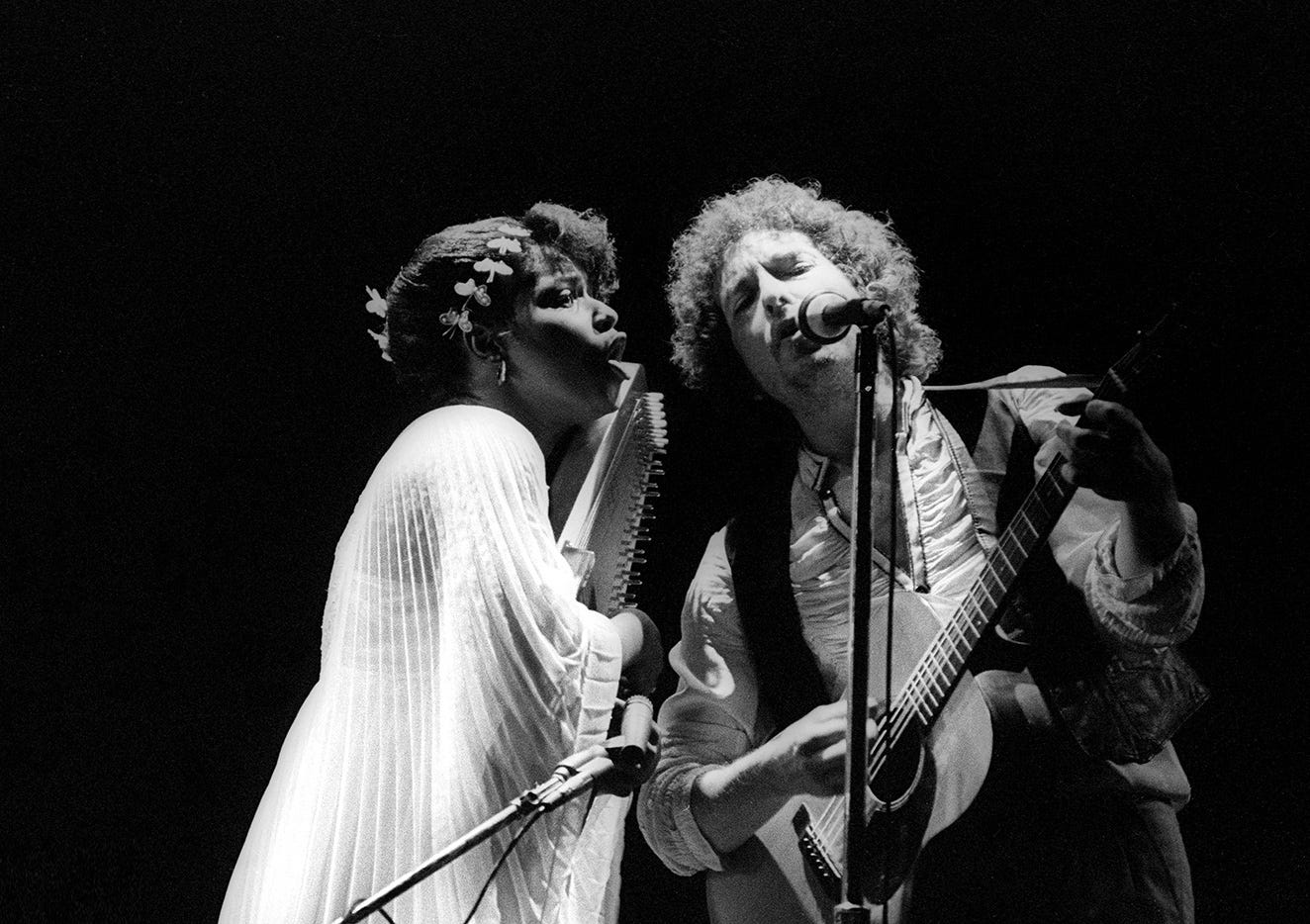
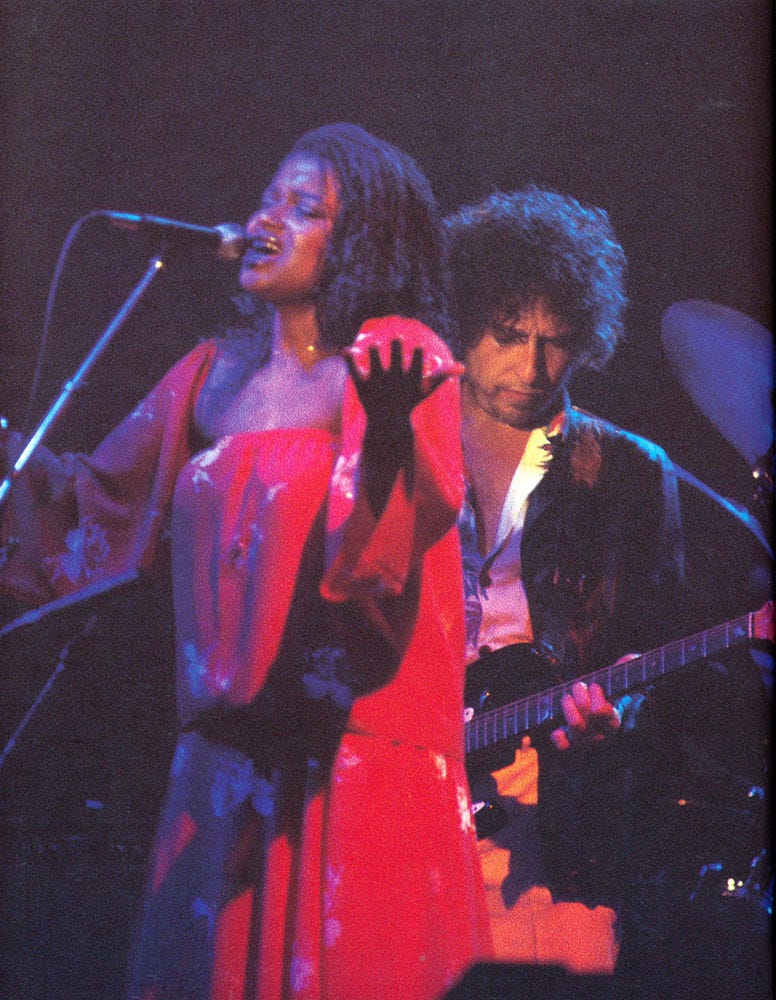
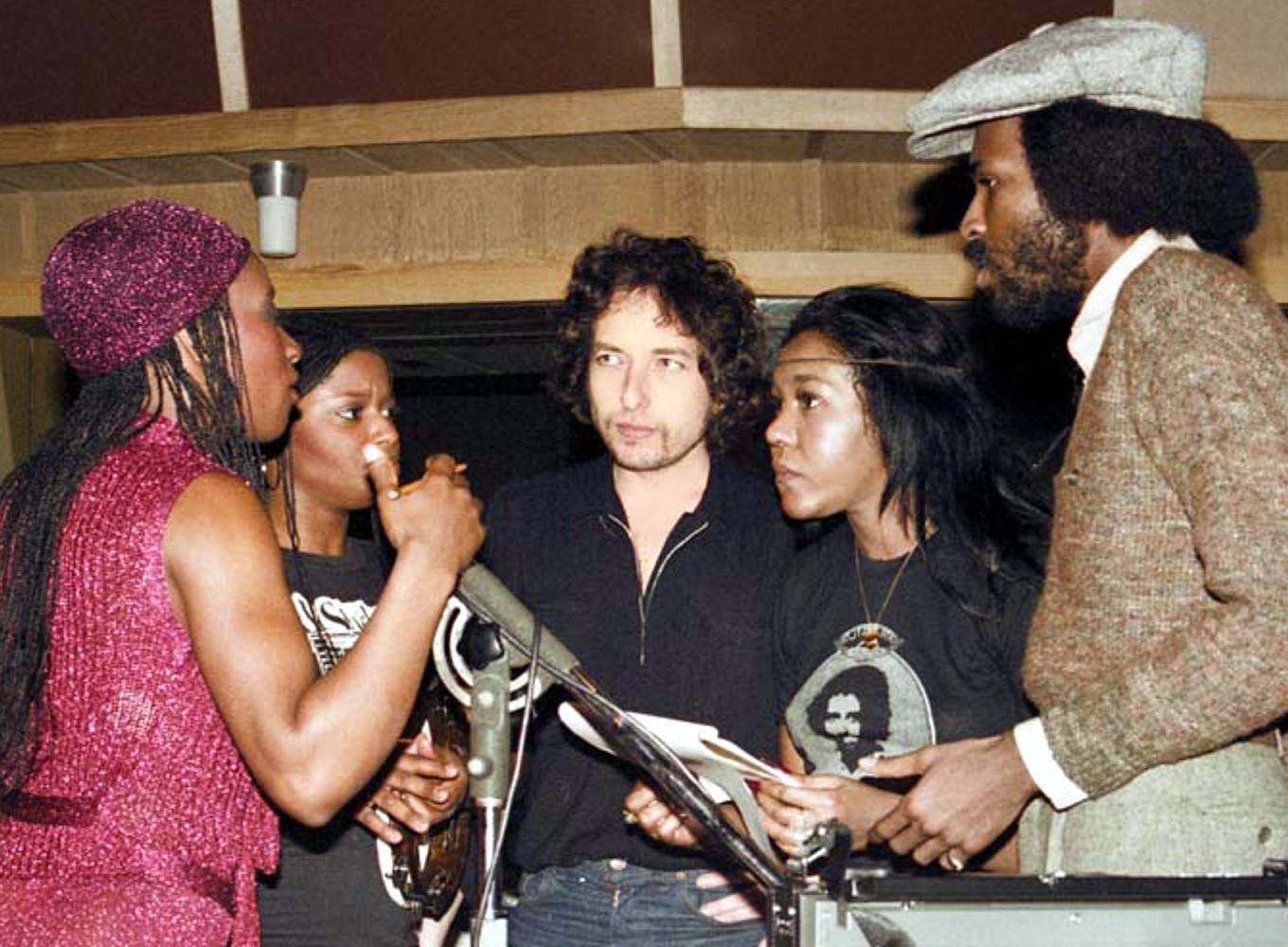
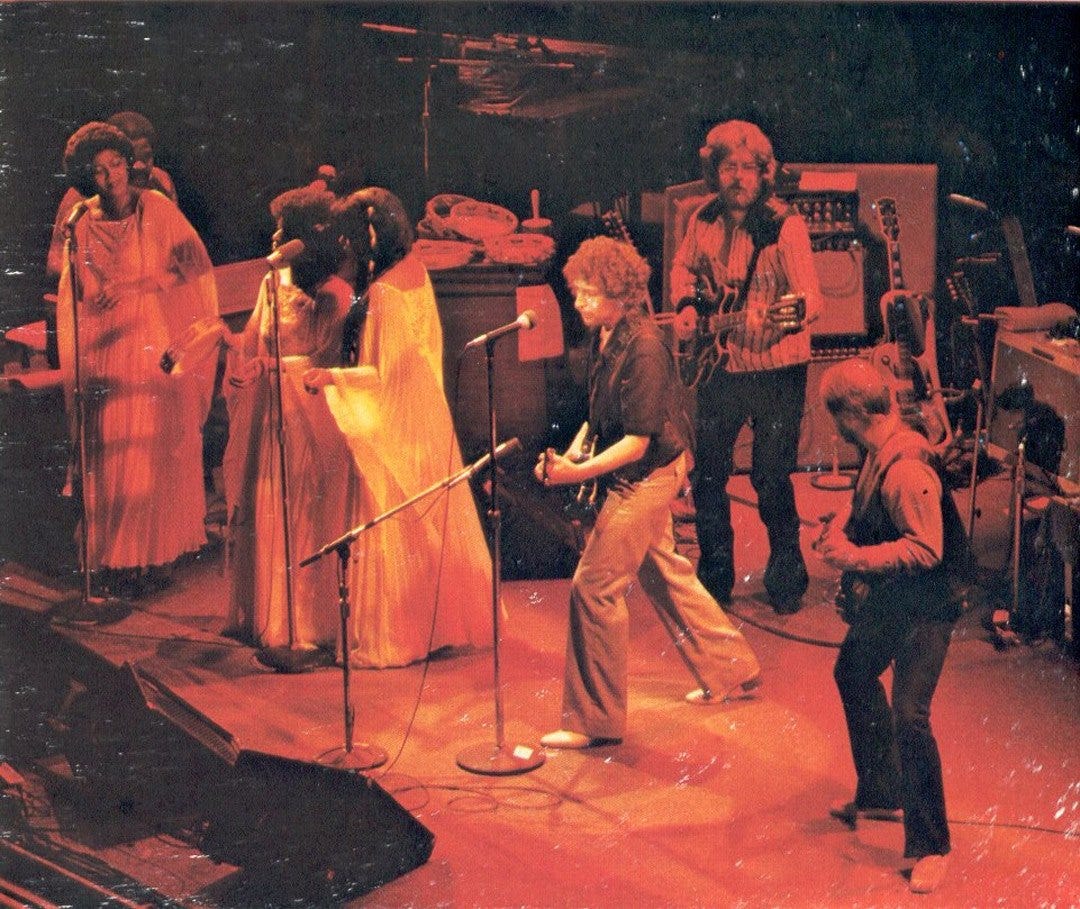




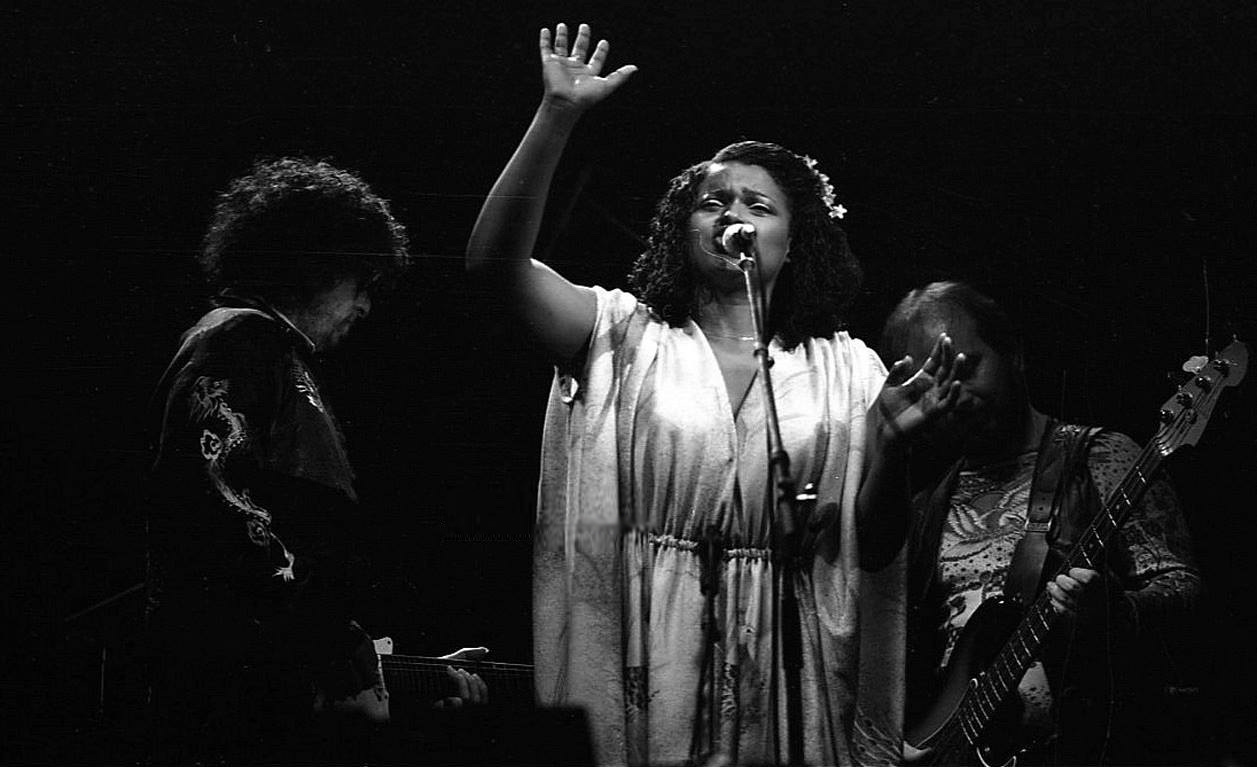
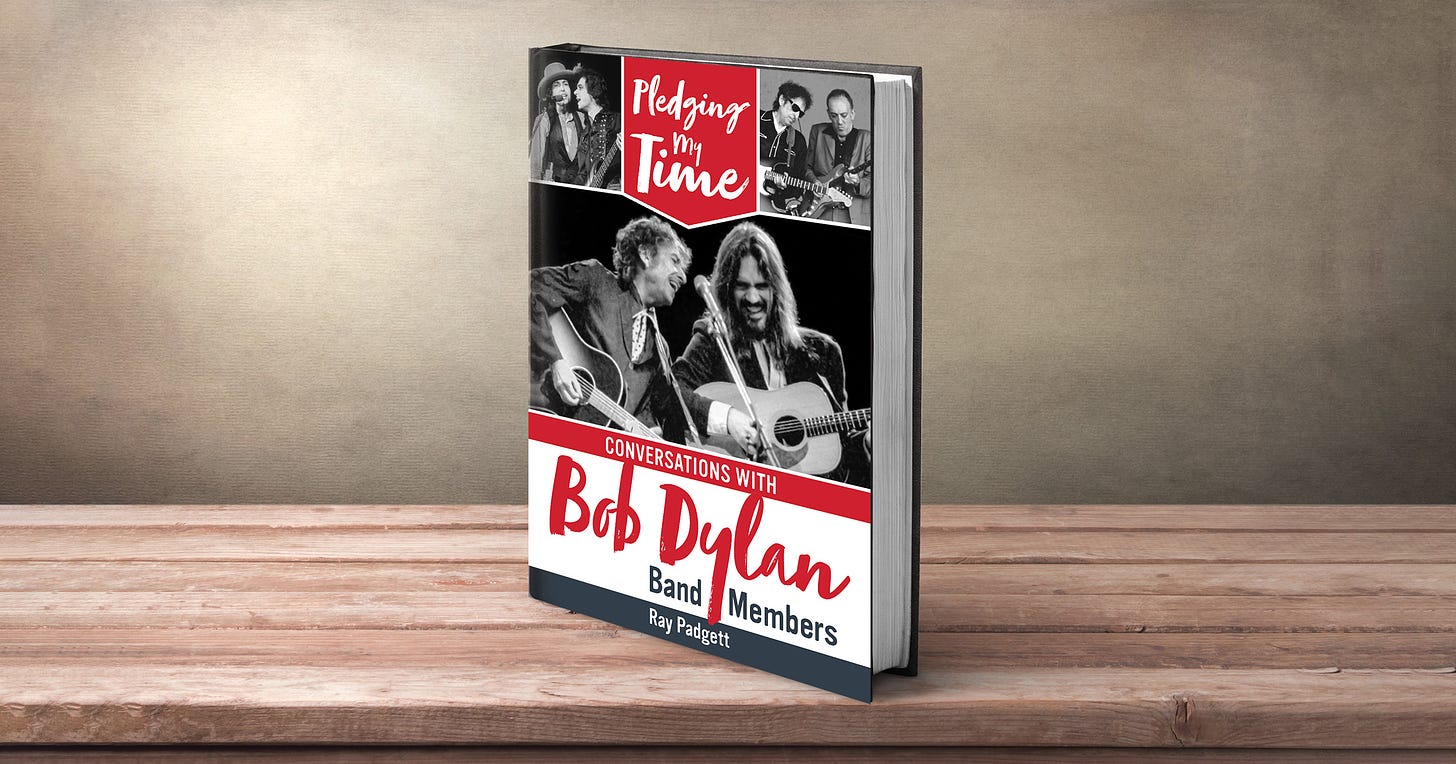
"I will always keep up with Bob Dylan. I will always be concerned and will always keep up with him because he's a good man. He's a good man." Great to read that. Wonderful interview. Thank you.
These are always great. A couple of points, I went to just about all the Warfield shows and remember them well. I remember the "booing" as occasional boos, quite a few catcalls (Come on, Bob, play the good stuff!) and a LOT of people who wanted to hear the show booing the catcallers or otherwise telling them to shut up which led to a lot of noise. I had bought advance tickets for the first 3 shows and then after that, I'd show up and scalpers would be trying to sell tickets for fairly outrageous prices and I'd wait for Regina to start talking and the price would drop to $5 and I'd buy one and go in. Also, the scene in front was crazy because after the first few shows, the sidewalks were jammed with Jews for Jesus, Moonies, and every other kind of religious missionary which drove away those who were not into the religious aspect of the shows.